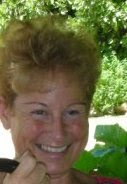Wishing to avoid the usual catcalls and chaos in the lower parking lot at Reihan, we went directly to the upper entrance to the terminal where we can see if there are any problems of people being delayed. Two windows remained open for the entire time we were there. For a change we didn't have to initiate a phone call to demand that they open another inspection booth. One of the women inspectors noted what was going on at the entrance and said to her colleague over the loudspeaker: “They’re talking to the women from “Watch.” Good. They knowthat we are here. Throughout the hour we observed the usual routine: the turnstile opening every five minutes and 9-12 people entering each time. Occasionally someone got caught inside the turnstile and had to remain standing in this “cage” until it turned again, occasionally someone got hit by the turnstile. The line outside occasionally grew to a dozen people but people continued to enter quickly. We wonder why people are not simply admitted to the air-conditioned terminal to wait there, rather than stand out in the sun.
A woman with an infant and two other small children attempted to pass through to the seamline zone and was refused. We could not find out why. A man from Jerusalem attempted to get back into the West Bank without a permit. He wanders about at the entrance and people shout at us. “He’s been here for six hours already. What’s he going to do? Sleep here?”
Evidently there is a wedding today and families dressed up in holiday clothes are coming from the Israeli side of Barta’a. As we left the entrance and walked back to the upper parking lot we saw a lineup of half a dozen cars - evidently the wedding party - waiting to get through to the West Bank. A taxi on its way to the seamline zone is being held up and everyone is waiting. People are standing next tot the cars in holiday clothes – including a woman who appears to be the bride - waiting to have their documents checked. People driving through are now allowed to be checked at the vehicle checkpoint and drive through without passengers having to go through the terminal. From inside one of the cars we can hear someone playing a darbuka and people clapping hands. We clap with then and shout "Mabruk! Mabruk!" As we leave the taxi going through towards the seamline zone that was holding up traffic is released and the wedding procession drives through.
A man accosts us. “The humiliation we have to go through at the checkpoints – there’s nothing like it anywhere else. Maybe in South Africa.”
“Actually,” I answer, “There is, but that doesn’t make it right.” He is definitely preaching to the converted. It is unfair that we have to get shouted at, but I am used to this: we are there and available for people to let our ther anger.
Another man demands, “When will it end? When?” And I wonder myself.
skip to main |
skip to sidebar

Talk about indecision...
Thoughts from Bracha Ben-Avraham in Moshav Ben-Ami in Northern Israel
Picture of the Week

Talk about indecision...
About Me
Shalom from Bracha Ben-Avraham in Moshav Ben-Ami in the Western Galilee! Here you'll find reflections, thoughts, and commentary about the Middle East, the Galilee, and life in Israel.
